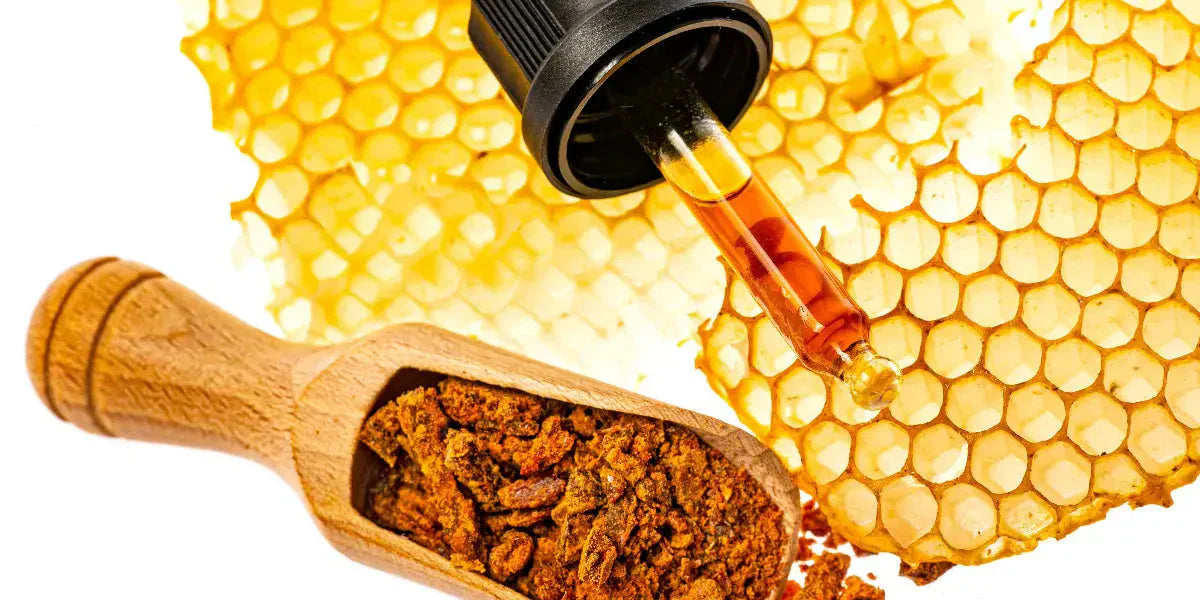
Propolis rich in antioxidant and restorative properties
|
|
|
Time to read 3 min
|
|
|
Time to read 3 min
Propolis is a natural substance collected by bees from the resin of trees, particularly white birch . Used by bees to protect the hive, propolis is rich in phytochemical compounds that have exceptional antioxidant and restorative capacity. The purpose of this article is to discuss these properties in detail.
This introduction will introduce you to the main characteristics of propolis and how it is used in the bee world. Then we will come to the fundamental question: why is white birch propolis so beneficial for us humans?
It is important to note that the beneficial properties of propolis are largely due to its richness in phytochemicals. These are known for their antioxidant and restorative properties, but how do they really work? This is what we will see in the next sections of this article.
Propolis , also known as beeswax, is a rich and infinitely varied substance, constantly renewed by bees to wrap and protect their hive. It is essentially composed of resin and pollen, two elements that give this material a complex molecular structure, which varies according to the floral environment of the colony. However, among the many compounds found in propolis, certain phytochemical elements predominate by their importance.
According to recent phytochemical research, propolis contains flavonoids , polyphenols and phenolic acids , three types of well-known antioxidant compounds. Flavonoids, distinguished by their varied molecular composition, actively strengthen the hive's defenses while providing a characteristic hue to propolis. Polyphenols and phenolic acids, equally diverse, are distinguished by their antioxidant and anti-inflammatory properties.
Flavonoids are widely recognized for their antioxidant properties and are essential for preventing cellular oxidation and inflammation. With over 20 different varieties identified in propolis, they form a robust and beneficial complex of antioxidant molecules.
These compounds contain an excellent source of protection against free radicals, unstable chemical entities that contribute to biological wear and tear and degenerative diseases. In addition, their restorative action on damaged tissues makes them ideal allies for healing and cellular regeneration.
Thus, it is undeniable that the chemical composition of propolis is rich and varied, offering a wide range of beneficial properties for health. Work in phytochemistry, and in particular that on propolis compounds, is therefore at the forefront of current scientific research.
Propolis is a resinous substance that bees collect from the buds of poplars and conifers. Known for its antioxidant and restorative properties, it is widely used in natural medicine . But what makes the antioxidant and restorative properties of propolis a focal point of scientific research?
The antioxidant capacity of propolis is mainly due to its rich composition of flavonoids and polyphenols . These phytochemicals effectively fight free radicals, unstable molecules that can damage cells and contribute to the onset of chronic diseases and premature aging.
Numerous studies have shown that this bee resin is a powerful natural antioxidant , capable of strengthening the immune system and protecting the body against oxidative damage. Its antioxidant power is not only preventive, but also curative, improving antioxidant status and reducing oxidative stress in individuals with various conditions.
Apart from its antioxidant properties, propolis is also known for its restorative properties . It is widely used to promote wound healing and tissue repair . The flavonoids and other bioactive compounds present in propolis promote tissue regeneration and stimulate the formation of new blood vessels, helping to speed up the healing process.
Additionally, the antibacterial properties of propolis help prevent infections that can delay wound healing. Therefore, this bee resin is not only beneficial for general health, but also for tissue repair and renewal.
Over the years, rigorous scientific research has highlighted the importance of propolis for human health . Its rich antioxidant compounds and restorative properties make it a formidable ally for the care of our body, protecting us against oxidative stress and helping to keep our skin and tissues healthy.